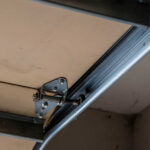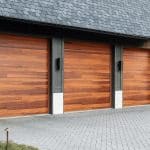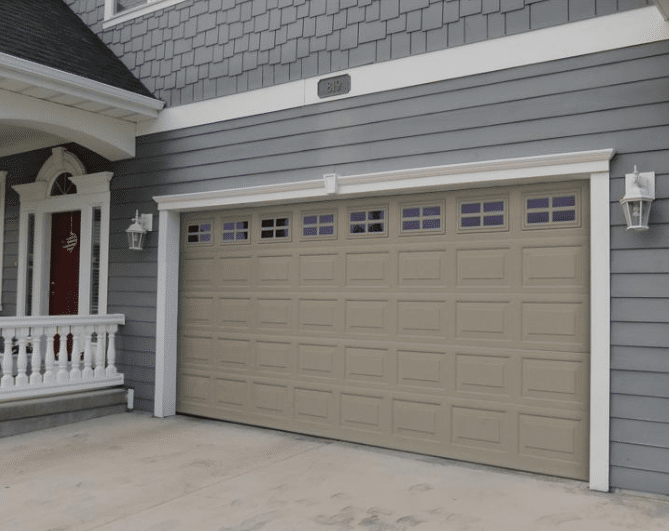Wondering which garage door material is better for your home? Discover the differences between steel vs aluminum garage doors and learn which performs best for your climate.
Choosing between steel vs aluminum garage doors is a decision that impacts your home’s efficiency, security, and maintenance for years to come. These two popular materials are often compared because of their specific strengths and limitations, depending on the climate where you live. If you want your next garage door to be durable, practical, and aligned with your environmental conditions, understanding these differences is essential.
Homeowners frequently ask: Which is better for cold weather? Which lasts longer near the coast? These questions are valid and deserve detailed answers. In this blog, we’ll explore the advantages and disadvantages of each material, focusing on their performance under different environmental conditions, energy efficiency, and long-term maintenance requirements. You’ll gain expert insights to help make an informed, confident decision based on facts rather than assumptions.
How Climate Influences the Performance of Steel vs Aluminum Garage Doors
Your local climate plays a major role when selecting between steel and aluminum garage doors. Weather conditions can significantly affect performance and longevity. Whether dealing with harsh winters, high humidity, or extreme heat, knowing how each material responds can help you avoid unnecessary repairs or replacements.
Choosing the right material for your climate will help ensure your garage door provides reliable performance, maintains its appearance, and contributes to your home’s energy efficiency for years to come.
Steel Garage Doors in Different Climates
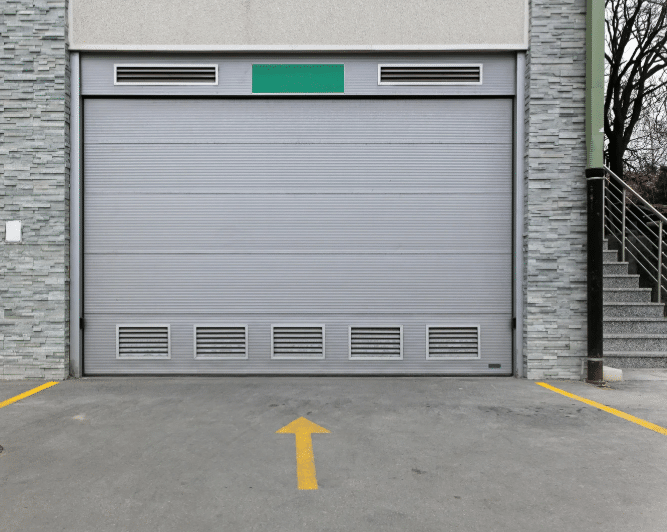
Strength and Durability:
- Steel garage doors are widely known for their exceptional strength and durability, making them an ideal choice for homes located in areas with extreme weather conditions.
- These doors are particularly effective in withstanding the rigors of harsh winters, including heavy snow, ice accumulation, and high winds. The solid structure of steel helps protect the garage and home from weather-related damage.
- Steel’s sturdy construction also adds a layer of security, which is valuable in climates where severe storms can lead to increased risk of break-ins.
Potential Drawbacks:
- One of the primary considerations with steel garage doors is their vulnerability to rust and corrosion when exposed to prolonged moisture, especially in coastal areas or regions with high humidity.
- Without proper maintenance—such as applying rust-resistant coatings and performing regular inspections—steel doors can begin to show signs of wear, including corrosion, which may shorten their lifespan.
- Salt exposure from ocean air or winter road treatments can accelerate rusting, making steel less ideal for seaside communities unless regularly treated.
Best for:
- Steel garage doors perform best in cold, dry, or mixed climates where moisture exposure is not a constant concern.
- Homeowners looking for strong, impact-resistant doors with insulation options for energy efficiency during extreme temperatures will find steel to be a reliable choice.
Aluminum Garage Doors in Different Climates
Resistance to Corrosion:
- Aluminum garage doors are naturally resistant to rust, making them especially suitable for homes in humid, coastal, or rainy environments. Unlike steel, aluminum will not corrode over time due to moisture, reducing the need for protective coatings and treatments.
- This material performs well in climates where frequent rainfall, high humidity, or salt air are common, helping to maintain the door’s appearance and functionality with minimal maintenance.
Potential Drawbacks:
- While aluminum is corrosion-resistant, it is a softer, lighter material than steel and can be more susceptible to dents and surface damage from hail, flying debris, or even accidental impacts like a basketball or bicycle.
- In regions with extreme heat or cold, aluminum doors typically provide less insulation than insulated steel models, which can result in higher energy costs to heat or cool the space inside the garage.
Best for:
- Aluminum garage doors are highly recommended for coastal, humid, or wet climates where moisture and rust are persistent concerns.
- Homeowners who prioritize low-maintenance materials and modern aesthetics, and who live in milder climates without significant temperature extremes, will benefit from aluminum options.
Key Considerations When Choosing for Your Climate
- Cold Climates: Steel doors are generally the preferred choice thanks to their strength, durability, and the availability of high-quality insulation options. Insulated steel doors help maintain consistent indoor temperatures, reducing heating costs during frigid winters.
- Humid or Coastal Climates: Aluminum is the standout choice for environments with high humidity, salt air, or frequent rain. Its natural resistance to rust eliminates concerns over corrosion, making it a low-maintenance, long-lasting solution.
- Areas with Temperature Extremes: Insulated steel garage doors help regulate internal garage temperatures, offering superior energy efficiency in both extremely hot and cold environments. Aluminum doors can be less effective in maintaining energy efficiency under such conditions.
- Regions with Heavy Rainfall: Aluminum’s corrosion resistance makes it a better option in regions prone to frequent or heavy rainfall. Homeowners in such areas will appreciate the reduced maintenance and peace of mind that aluminum provides.
Additional Factors to Consider:
- Think about how often your garage door is used. High-traffic garages in tough climates may benefit more from the durability of steel.
- Consider the aesthetic goals for your home. Both materials come in various finishes and styles, but aluminum often offers sleeker, modern design options.
- Weigh the long-term costs. While aluminum may cost more upfront, its reduced maintenance could save money in the long run, depending on your climate.
Steel vs Aluminum Garage Doors: Pros and Cons Uncovered
Durability and Longevity Compared
Steel garage doors are preferred in areas requiring security and resilience. They are less likely to dent and hold up better against impact, making them suitable for regions prone to storms or where enhancedextra security is needednecessary. Aluminum garage doors are lighter but more prone to dents from minor impacts. However, aluminum’s resistance to rust offers a clear benefit in moist or salty environments.
Insulation and Energy Efficiency Matter
Steel garage doors often come with better insulation options, helping maintain stable indoor temperatures and reducing energy costs. This makes steel ideal for cold or variable climates where insulation is a priority. Aluminum doors typically offer lower insulation values unless upgraded with added layers, which can lead to higher energy consumption.
If you are considering upgrading your existing setup for better efficiency, our garage door repair services can ensure your home’s thermal performance is optimized.
Maintenance Differences to Know
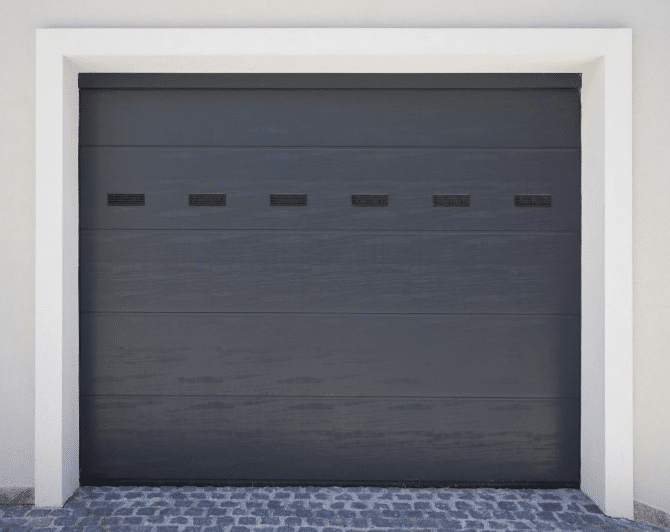
Aluminum requires minimal maintenance due to its natural corrosion resistance. Cleaning and occasional hardware checks are typically sufficient. Steel demands more frequent inspections for potential rust, especially in humid regions, though modern coatings reduce this risk significantly. Both materials benefit from regular servicing to extend their lifespan.
Aesthetic Flexibility and Design Options
Aluminum doors often provide sleek, modern designs with the flexibility of integrating glass panels. Steel doors offer a wider range of textures and classic designs that suit various architectural styles. Each material can complement your home’s exterior when chosen thoughtfully.
Which Climate Favors Steel vs Aluminum Garage Doors?
Ideal Choice for Cold, Snow-Prone Areas
Steel garage doors stand out in cold regions due to superior insulation capabilities and durability against snow, ice, and freezing temperatures. They maintain indoor warmth efficiently and withstand winter weather better.
Ideal Choice for Hot, Sunny Locations
Aluminum performs well in hot climates, especially when enhanced with reflective coatings to minimize heat absorption. Its lightweight structure reduces strain on door openers, making it an energy-efficient choice in sunny areas.
Ideal Choice for Coastal or Humid Environments
Aluminum is the top choicepick for coastal and humid climates thanks to its natural rust resistance. Homeowners near the ocean or in high-humidity zones benefit from aluminum’s longevity without worrying about corrosion.
Suitable Choice for Moderate Weather Regions
In regions with mild, moderate weather, either material performs adequately. The choice often comes down to personal preference, budget, and design compatibility with the home.
Comparing Security, Longevity, and Sustainability
Security Benefits of Steel vs. Aluminum Garage Doors
- Steel Garage Doors:
- Heavier weight and solid structure enhance security.
- Reinforced panels and advanced multi-point locking systems provide extra protection.
- Superior resistance to forced entry and break-ins.
- Heavier weight and solid structure enhance security.
- Aluminum Garage Doors:
- Lightweight and less resistant to impact.
- Less secure against determined intrusion compared to steel.
- Upgraded locks are available but still offer lower overall security than steel.
- Lightweight and less resistant to impact.
Lifespan and Cost Considerations
- Steel Garage Doors:
- Long-term durability with proper care and maintenance.
- May require anti-rust treatments in coastal or humid environments.
- Insulated models are available for improved energy efficiency, but at a higher initial cost.
- Long-term durability with proper care and maintenance.
- Aluminum Garage Doors:
- Naturally resistant to rust and corrosion—ideal for coastal or humid climates.
- Lower maintenance requirements contribute to cost-effectiveness over time.
- Slightly higher upfront cost than basic steel, but balances out with longevity in certain environments.
- Naturally resistant to rust and corrosion—ideal for coastal or humid climates.
Environmental Impact and Sustainability
- Aluminum:
- Highly recyclable and often made with recycled content.
- Fully recyclable at the end of its life cycle.
- Ideal for homeowners prioritizing eco-friendly materials.
- Highly recyclable and often made with recycled content.
- Steel:
- More energy-intensive to produce but often incorporates recycled materials.
- Long lifespan reduces the need for frequent replacement, conserving resources.
- Contributes to sustainability through durability and longevity.
- More energy-intensive to produce but often incorporates recycled materials.
Frequently Asked Questions
What are the primary differences between steel and aluminum garage doors?
Steel is stronger and better insulated, but it can rust if not maintained. Aluminum is lighter, doesn’t rust, but is more prone to dents.
Are aluminum garage doors good for cold weather?
Aluminum doors are less effective in cold climates unless upgraded with insulation. Steel typically performs better in freezing conditions.
How do I maintain steel vs aluminum garage doors?
Steel requires regular inspections for rust and potential repainting. Aluminum needs minimal maintenance but should be checked for dents and alignment issues.
Which costs more, steel or aluminum garage doors?
Aluminum can be pricier upfront for modern designs. Steel often provides cost-effective options with better security and insulation.
Do aluminum garage doors resist rust?
Yes, aluminum naturally resists rust, making it ideal for coastal and humid environments.
Conclusion
Choosing between steel vs aluminum garage doors comes down to understanding how each material aligns with your specific climate and home requirements. Steel provides unmatched strength, security, and insulation, making it a smart choice for colder climates or areas requiring durability. Aluminum stands out in humid or coastal environments where rust resistance and lightweight design matter most.
Both materials offer valuable benefits, but your local weather, home style, and maintenance preferences should guide your final choice. Balancing these factors ensures long-term satisfaction and performance.
We recommend consulting with trusted experts, such as Michigan Door, to explore your options further and ensure your investment delivers lasting value and protection.
End Note
We know how important it is to make the right choice when investing in your home’s garage door. Our team at Michigan Door brings years of industry expertise to help homeowners make informed decisions with confidence.
Stay connected with us on Facebook to see the latest updates and successful projects we’ve completed across Michigan communities. Our dedication to quality service and dependable solutions speaks through the work we do every day.
When you’re ready to explore your garage door options or need professional guidance, visit our Troy location or reach out directly through our contact page. We’re here to help you find the solution that perfectly suits your home and climate.


